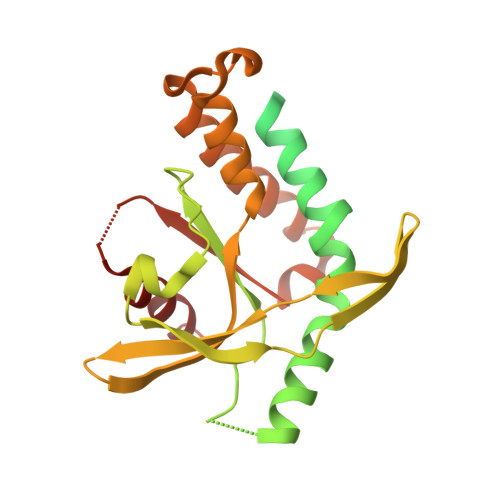An orally available non-nucleotide STING agonist with antitumor activity.
Pan, B.S., Perera, S.A., Piesvaux, J.A., Presland, J.P., Schroeder, G.K., Cumming, J.N., Trotter, B.W., Altman, M.D., Buevich, A.V., Cash, B., Cemerski, S., Chang, W., Chen, Y., Dandliker, P.J., Feng, G., Haidle, A., Henderson, T., Jewell, J., Kariv, I., Knemeyer, I., Kopinja, J., Lacey, B.M., Laskey, J., Lesburg, C.A., Liang, R., Long, B.J., Lu, M., Ma, Y., Minnihan, E.C., O'Donnell, G., Otte, R., Price, L., Rakhilina, L., Sauvagnat, B., Sharma, S., Tyagarajan, S., Woo, H., Wyss, D.F., Xu, S., Bennett, D.J., Addona, G.H.(2020) Science 369
- PubMed: 32820094
- DOI: https://doi.org/10.1126/science.aba6098
- Primary Citation of Related Structures:
6UKM, 6UKU, 6UKV, 6UKW, 6UKX, 6UKY, 6UKZ, 6UL0 - PubMed Abstract:
Pharmacological activation of the STING (stimulator of interferon genes)-controlled innate immune pathway is a promising therapeutic strategy for cancer. Here we report the identification of MSA-2, an orally available non-nucleotide human STING agonist. In syngeneic mouse tumor models, subcutaneous and oral MSA-2 regimens were well tolerated and stimulated interferon-β secretion in tumors, induced tumor regression with durable antitumor immunity, and synergized with anti-PD-1 therapy. Experimental and theoretical analyses showed that MSA-2 exists as interconverting monomers and dimers in solution, but only dimers bind and activate STING. This model was validated by using synthetic covalent MSA-2 dimers, which were potent agonists. Cellular potency of MSA-2 increased upon extracellular acidification, which mimics the tumor microenvironment. These properties appear to underpin the favorable activity and tolerability profiles of effective systemic administration of MSA-2.
Organizational Affiliation:
Department of Quantitative Biosciences, Merck & Co., Inc., Kenilworth, NJ, USA.














